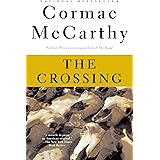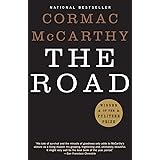
Download the free Kindle app and start reading Kindle books instantly on your smartphone, tablet, or computer - no Kindle device required.
Read instantly on your browser with Kindle for Web.
Using your mobile phone camera - scan the code below and download the Kindle app.

OK
 Audible sample Sample
Audible sample Sample 


All The Pretty Horses CD (The Border Trilogy) Audio CD – Unabridged, May 16, 2000
- LanguageEnglish
- PublisherHarperAudio
- Publication dateMay 16, 2000
- Dimensions5.25 x 0.25 x 6.75 inches
- ISBN-100694523445
- ISBN-13978-0694523443
"All the Little Raindrops: A Novel" by Mia Sheridan for $10.39
The chilling story of the abduction of two teenagers, their escape, and the dark secrets that, years later, bring them back to the scene of the crime. | Learn more
Similar items that may ship from close to you
Editorial Reviews
Review
Product details
- Publisher : HarperAudio; Unabridged edition (May 16, 2000)
- Language : English
- ISBN-10 : 0694523445
- ISBN-13 : 978-0694523443
- Item Weight : 13.8 ounces
- Dimensions : 5.25 x 0.25 x 6.75 inches
- Best Sellers Rank: #3,491,938 in Books (See Top 100 in Books)
- #22,892 in Books on CD
- #31,358 in Westerns (Books)
- #128,655 in Literary Fiction (Books)
- Customer Reviews:
About the author

Cormac McCarthy was born in Rhode Island. He later went to Chicago, where he worked as an auto mechanic while writing his first novel, The Orchard Keeper. The Orchard Keeper was published by Random House in 1965; McCarthy's editor there was Albert Erskine, William Faulkner's long-time editor. Before publication, McCarthy received a travelling fellowship from the American Academy of Arts and Letters, which he used to travel to Ireland. In 1966 he also received the Rockefeller Foundation Grant, with which he continued to tour Europe, settling on the island of Ibiza. Here, McCarthy completed revisions of his next novel, Outer Dark. In 1967, McCarthy returned to the United States, moving to Tennessee. Outer Dark was published in 1968, and McCarthy received the Guggenheim Fellowship for Creative Writing in 1969. His next novel, Child of God, was published in 1973. From 1974 to 1975, McCarthy worked on the screenplay for a PBS film called The Gardener's Son, which premiered in 1977. A revised version of the screenplay was later published by Ecco Press. In the late 1970s, McCarthy moved to Texas, and in 1979 published his fourth novel, Suttree, a book that had occupied his writing life on and off for twenty years. He received a MacArthur Fellowship in 1981, and published his fifth novel, Blood Meridian, in 1985. All the Pretty Horses, the first volume of The Border Trilogy, was published in 1992. It won both the National Book Award and the National Book Critics Circle Award and was later turned into a feature film. The Stonemason, a play that McCarthy had written in the mid-1970s and subsequently revised, was published by Ecco Press in 1994. Soon thereafter, the second volume of The Border Trilogy, The Crossing, was published with the third volume, Cities of the Plain, following in 1998. McCarthy's next novel, No Country for Old Men, was published in 2005. This was followed in 2006 by a novel in dramatic form, The Sunset Limited, originally performed by Steppenwolf Theatre Company of Chicago. McCarthy's most recent novel, The Road, was published in 2006 and won the Pulitzer Prize.
Customer reviews
Customer Reviews, including Product Star Ratings help customers to learn more about the product and decide whether it is the right product for them.
To calculate the overall star rating and percentage breakdown by star, we don’t use a simple average. Instead, our system considers things like how recent a review is and if the reviewer bought the item on Amazon. It also analyzed reviews to verify trustworthiness.
Learn more how customers reviews work on AmazonReviews with images
-
Top reviews
Top reviews from the United States
There was a problem filtering reviews right now. Please try again later.
John Grady and Rawlings embark on an adventure that is exciting, romantic, grueling, perplexing, tragic, poignant, and heroic. But it's not the tidal swells of this quest that makes this novel such a rewarding read. It's the minute sensations and observations that McCarthy conveys that make it such a transcendent book.
"Nightfall found them in the foothills of the Sierra Encantada. They followed a dry watercourse up under a dark rincon in the rocks and picked their way over a flood barricade of boulders tumbled in the floor of the wash and emerged upon a stone tinaja in the center of which lay a shallow basin of water, perfectly round, perfectly black, where the night stars were lensed in perfect stillness."
The protagonists are teenagers, so it's tempting to view this as a coming of age story, but they are already mature beyond their years. Indeed it is their mature virtues, or at least John Grady's virtues, that propel the story forward. He seems to have burst from the womb fully formed as an adult who is capable of shouldering responsibilities and hardships. Does he grow as a result of his adventure? He emerges unsullied by the pessimism born of experience, so it's hard to say what change he undergoes.
And that's the conceit of McCarthy's style. The story is told almost entirely from the perspective of an outside observer. We watch John Grady and Rawlings from afar. McCarthy almost never reveals their thoughts or feelings. The reader is an objective party in this story and it is your responsibility to piece together the characters' reactions and emotions. It's an odd viewpoint, but one that is deeply satisfying if only because that objective perspective is conveyed so skillfully by McCarthy. A towering achievement in western literature.
Also, this book is not as dark as other McCarthy novels. I found that refreshing. It's much more an adventure novel. It has some great quotes too that I had to write down after I read them. Just two of my favorites, that encapsulate the two animating emotional cores in this book (simple, old Western matter of factness and beautiful, poetic, imagery):
“[S]cared money can’t win and a worried man can’t love.”
“He thought that in the beauty of the world were hid a secret. . . . The world’s pain and its beauty moved in a relationship of diverging equity and that in this headlong deficit the blood of multitudes might ultimately be exacted for the vision of a single flower.”
All that being said, I don't think this is one of McCarthy's best. There were a few scenes that lacked creativity. That's not much criticism, but McCarthy sets the bar pretty high for himself. Especially when a book like The Road is perfect throughout. That book is such a flawless piece of writing. Every single word of that book is in the absolute best and only place it should be.
Top reviews from other countries
"All The Pretty Horses" isn't a mere novel; it's an ode to the old frontier, a testament to the cowboy spirit, and a love letter to the open road. So if you're yearning for a taste of the wild, look no further.










